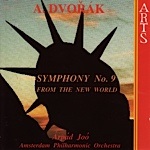This is a very respectable Dvorák Symphony No. 9 that holds no surprises. Arpád Jóo employs mostly moderate tempos and falls short of the dramatic thrust found with Bernstein, Kubelik, or Kondrashin. What does inject drama are the aural characteristics of Concertgebouw Hall, which makes horn calls sound as if issuing from a distance and gives timpani rolls a thunderous roar. Of course, this also can be heard with the actual Concertgebouw Orchestra in a fine performance recorded by Colin Davis (whose Philips Duo release includes Symphonies Nos. 7 and 8).
The Amsterdam Philharmonic may not match the Concertgebouw’s tonal richness and distinctiveness (the woodwinds lack color) or ensemble clarity (the brass doesn’t pierce through the texture enough), but it does offer a well played rendition of the piece. Jóo effectively communicates a sense of homesickness in the tender Largo and generates impressive rhythmic energy in the scherzo. In all, it’s very well done. Fans of Jóo who can overlook the sonic limitations (cloudiness at tuttis, lack of air around the orchestra) will be pleased with this disc. Others are directed to the more compelling listed alternatives.
































